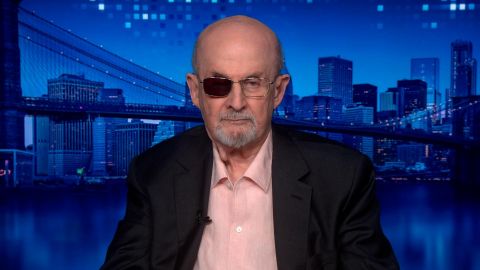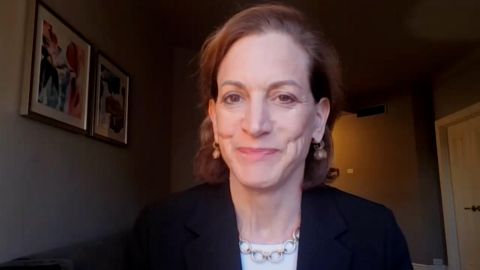Read Transcript EXPAND
CHRISTIANE AMANPOUR, CHIEF INTERNATIONAL ANCHOR: Salman, you talk about the A, that is the assailant, the assassin, the asinine. Aou call him the A throughout. You don’t use his name. You describe him as a murderous ghost from the past. And I found it really interesting that in the book you — and in your life you grapple with whether, at some point — I mean, quite early on, before you even recovered, you were grappling with whether you should go to see him, confront him, talk to him, understand his motivation.
SALMAN RUSHDIE, AUTHOR, “KNIFE” AND AWARD-WINNING AUTHOR: Yes. I mean, I — that was — my first thought was as a kind of journalistic impulse to go and sit in a room with him and say, OK, tell me why you did it. And I was disabused of that. I mean, first of all, it seemed very improbable that his legal representation would agree to that. Eliza was very against it. And then, you know, I read this story of Samuel Beckett who was also stabbed in Paris and in a street by a pimp. And he actually did go to the court and ask the man, why did you do it? And all the man said was, I don’t know, sir. I’m sorry. And I thought, well, that doesn’t get you very far, does it? It doesn’t explain anything. And I thought maybe if I did meet this guy, I would get some banality of that kind. You know, I didn’t think I would get remorse. There doesn’t seem to be any sign of remorse. But I thought I’d get some cliche. And so, pointless. And I thought actually I would do better to use the skill I’ve got of imagination and storytelling to try and imagine myself into his head and work out a kind of coherent portrait to somebody who could have done this.
AMANPOUR: It’s really interesting, that chapter. And I want to ask you, because I think we know, because this — the assailant gave an interview to one of the New York tabloids, that he didn’t read the satanic verses. He didn’t sound like he had any motivation for this.
RUSHDIE: Yes, I mean, he didn’t read — he said he’d read two pages of something I’d written. He didn’t say what. And that he’d seen a couple of YouTube videos, and that was enough for him to decide to commit murder. I mean, it’s a — I mean, it shows me that indoctrination can be a very powerful force. There are people, like I suspect this young man of being, who kind of need to be led, who need to be given a direction in life because they don’t feel that they have it. And something put the force in his head. Well, clearly, he said he was an admirer of Khomeini and so on. So, clearly, he was thinking along those lines. And at some point, he heard about me giving a speech at Chautauqua and decided that I was his target. It’s kind of a mystery why it became — why it turned out to be me.
AMANPOUR: Yes. And you divide the book into two distinct chapters, the chapter of hate and death and the chapter of life and love. And you talk a lot about, you know, your wife, about your family, but writing about happiness. I like this little bit. You said, I’ve always been interested in writing about happiness in large part because it’s extremely difficult to do. And you quote a previous writer from a yesteryear saying that it’s like writing with white ink on a white page. So, do you think you actually succeeded in writing about your happiness in the second half of the book?
RUSHDIE: Well, you tell me, Christiane. I mean, I think I did, yes.
AMANPOUR: Yes, I think you did.
RUSHDIE: I think it’s for the reader to judge.
AMANPOUR: I think you did.
RUSHDIE: I think it’s for the reader to judge. Thank you. Well, I think it was — we had — I mean, Eliza and I had been together for, you know, five and a half years before the attack happened. And we had had a very happy life, and it was as if we were in a love story, and then somebody tried to turn that into a murder story, and then we worked very hard to turn it back into a love story. So, it’s a — I say in the book that, yes, we did manage, I think, to reconstruct our happiness, but it wasn’t exactly the same as it had been, that there’s a kind of shadow in it. There’s a kind — what I describe as a wounded happiness. But happiness, nevertheless.
About This Episode EXPAND
UK Shadow Foreign Secretary David Lammy is encouraging “progressive realism” as Britain increases its defense spending in the midst of increased conflict across the globe. Author Salman Rushdie addresses the 2022 stabbing attack that almost took his life in his new book “Knife: Meditations After an Attempted Murder.” The Atlantic’s Anne Applebaum on why Ukraine must defeat Russia.
LEARN MORE

